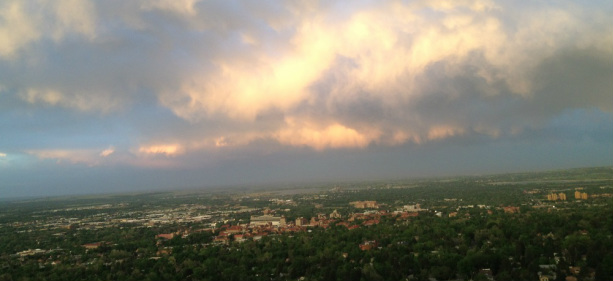|
This week marks the end of my master's program at CU Boulder. I have passed all the required courses. I have successfully completed a newspaper internship. I have written and defended my thesis. On Thursday, pending getting all the right signatures on the right lines, I will be walking across the stage in Macky Auditorium wearing a stuffy black cap and gown. (If anyone knows the significance of this apparently academic attire, please enlighten me).
But walking across the stage is not the daunting part. I plan to wear moccasins or Chacos or some such footwear to preclude tripping. The daunting part is the metaphorical parallels of this act--crossing into the next stage of my life, this time with a title and its associated expectations: environmental journalist. I came back to school in search of fulfillment. I had tried the environmental consulting gig. I had given teaching English abroad a shot. But as much as I gained from these experiences, they didn't feel...right. There was no deep sense of satisfaction or purpose. So I dusted off my backpack, sharpened my pencils, and headed up the stairs at 1511 University Ave. to try my hand at graduate school. I chose environmental journalism because it seemed like the one field that could combine the hotdish of disparate interests listed on my undergraduate diploma: environmental studies, English and French. I imagined myself as a foreign correspondent reporting on critical environmental issues in French-speaking Africa. But I quickly found that academia can be just as disenchanting as the "real world." The week I arrived in Boulder, the journalism school closed. None of us knew the implications of this administrative move, and to be honest, two years later, I still don't. Apparently it's nothing to worry about. We operate in a department now instead of a school and I'll still get a pretty, embossed piece of paper that says I win. So as this academic interlude comes to a close, I have begun to reflect on the experience. Did I find graduate school fulfilling? On a strictly academic level, perhaps not. But by being proactive I was able to seek out the elements that made the experience worthwhile. I co-founded an online environmental magazine. I published front page stories in the Daily Camera. I conducted live interviews on KGNU radio. I met amazing people doing amazing work in the field of environmental journalism. In the end, I found reporting on environmental issues to be profoundly satisfying. My stories reached people. Granted, in some cases the audience response was pretty minimal, but it was always exciting to hear that people had read or listened to my work. People reflected and conversed and acted in ways that they otherwise may not have. This felt right. But thus far I have been hired as much-appreciated free labor. The challenge now is to figure out how to make a living out of it, especially since my chosen field (journalism) appears to be on life support. I am leaving grad school with barely a job prospect on the horizon, and this is not for a lack of effort in the application process. Jobs in journalism are becoming fewer, with lower salaries and greater competition. I applied for an entry level reporting job in Seattle a few weeks back and the editor told me that I was one of 600 applicants vying for the position. 600! Another magazine was looking for interns to answer phones, sort mail and fact-check, and they were specifically looking for candidates with master's degrees. This is the type of work I should aspire to after completing two years of graduate school!? I know I shouldn't be picky at this point, but I feel like actually writing is a requisite component. The field of journalism is undergoing an identity crisis right now. And consequently so am I. Hopefully our paths will converge in the form of a job that involves writing and actually pays. In the mean time I will simply write. I have three months until my lease expires, during which time I plan to write--a book, copious amount of grants and job applications, and this blog. I hope you and I will both enjoy the process.
1 Comment
|
with intentions.
|

 RSS Feed
RSS Feed
